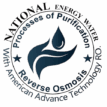Tap Water vs Bottled Water in Lahore: What’s Safer to Drink in 2025?
In 2025, the debate around tap water vs bottled water in Lahore has become increasingly relevant. With growing concerns over Lahore drinking water quality, many residents are questioning what’s truly safe to consume. While tap water is readily available and cost-effective, its safety is often compromised due to water contamination in Lahore.
On the other hand, bottled water is marketed as a cleaner, more reliable choice, especially with various best bottled water brands in Lahore offering mineral-rich options. As safe drinking water in Pakistan remains a public health priority, understanding the pros and cons of both sources is essential for making informed, health-conscious decisions.
2025 Water Quality Snapshot: What’s Coming Out of Lahore’s Taps?
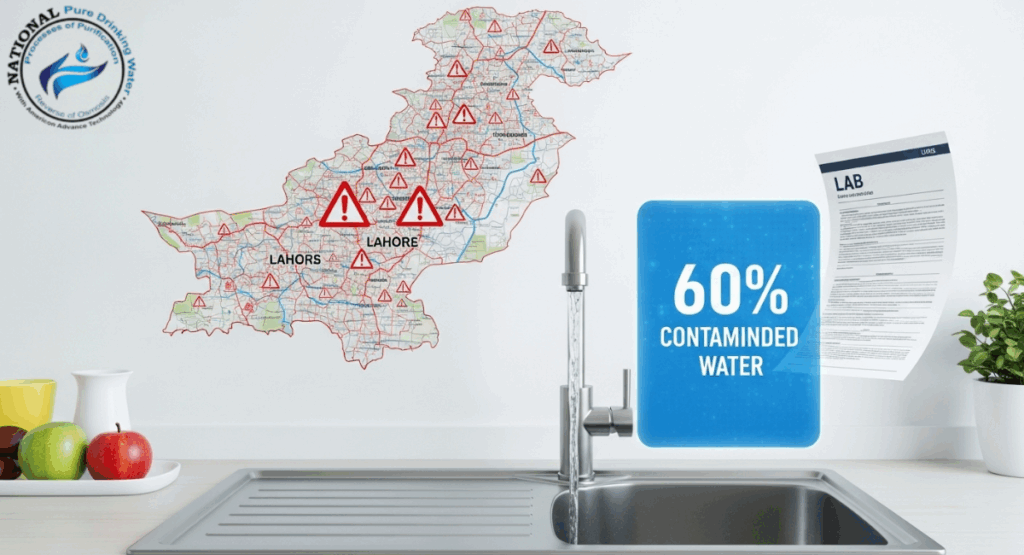
Lahore, one of Pakistan’s largest cities, is home to over 13 million people. Every day, the city’s water supply system delivers water to homes, offices, and schools. But what’s really inside that water?
In 2025, WASA Lahore released a report showing that more than 60% of water samples collected from urban areas contained harmful elements like arsenic, bacteria, and nitrates. In rural areas near Lahore, the situation was even worse.
A comparison revealed big differences:
- Urban areas: Higher chemical contamination
- Rural areas: More bacterial contamination due to unfiltered wells and hand pumps
Many residents report bad taste, smell, and even discoloration. Aging pipelines and poor infrastructure are key contributors to Lahore water supply issues.
Common Contaminants Found in Lahore’s Tap Water
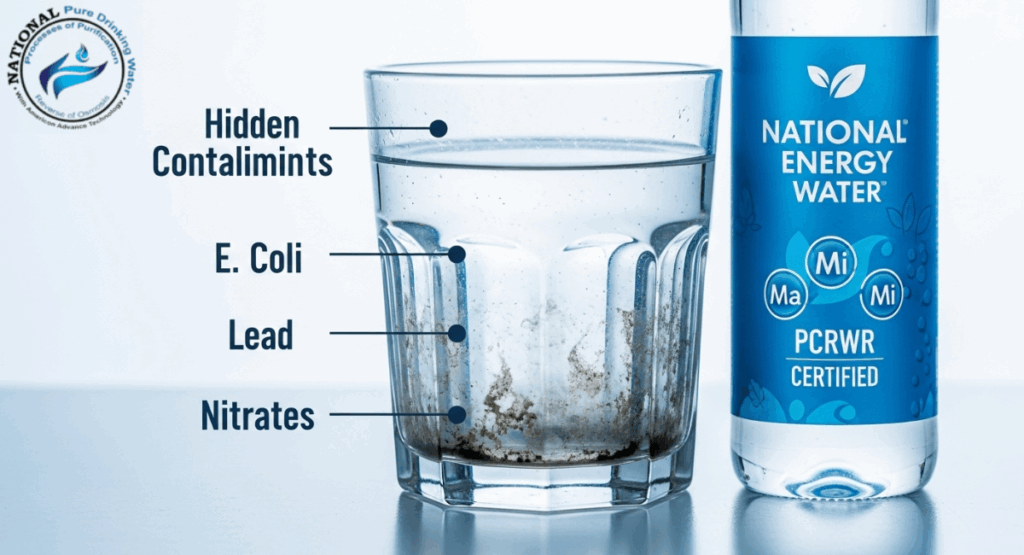
Recent lab tests have detected several harmful substances in Lahore’s tap water:
- E. coli
- Lead
- Fluoride
- Nitrates
- Pesticides
These contaminants mostly come from industrial waste, sewage mixing, and decaying underground pipelines. Even if the water looks clean, it can pose serious health risks if not properly filtered.
Bottled Water vs Tap Water: What’s the Real Difference?
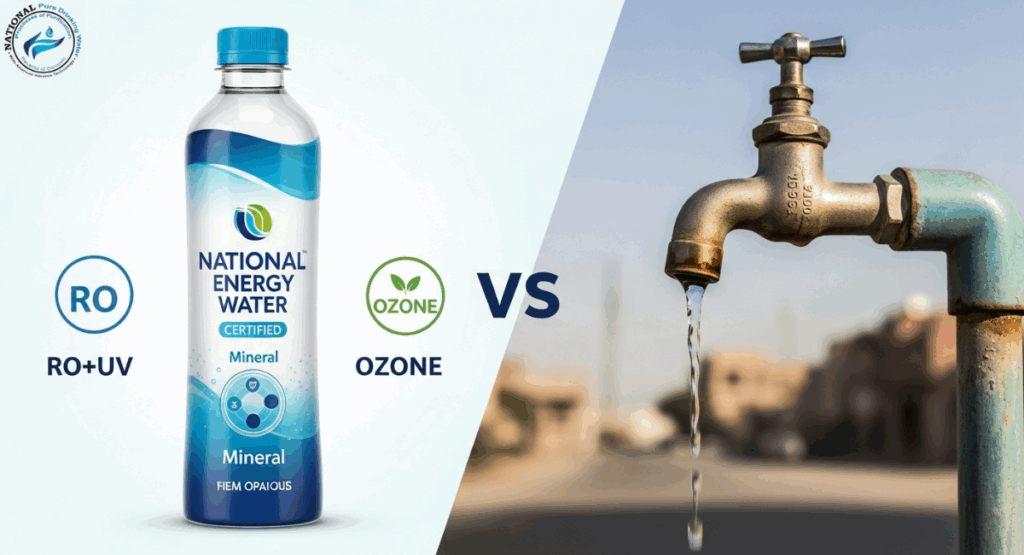
At first glance, both tap and bottled water look clear. But bottled water undergoes multi-step purification:
- Reverse osmosis (RO)
- UV light sterilization
- Ozonation
These processes eliminate most bacteria, viruses, and chemical impurities. In contrast, Lahore’s tap water often comes from groundwater or the Ravi River, with limited treatment. WASA treats water at plants, but contamination often happens during distribution due to broken pipes and unhygienic infrastructure.
Even filtered tap water in Lahore may remain risky if household filters are not maintained regularly.
Advanced Filtration Used in Bottled Water
Most bottled water brands in Lahore use a combination of:
- Reverse Osmosis (RO)
- UV Sterilization
- Ozone Treatment
These technologies help bottled water meet international purity standards. People with weak immune systems or chronic illnesses are particularly advised to consume bottled water for clean and safe hydration.
Health Risks of Contaminated Tap Water in Lahore
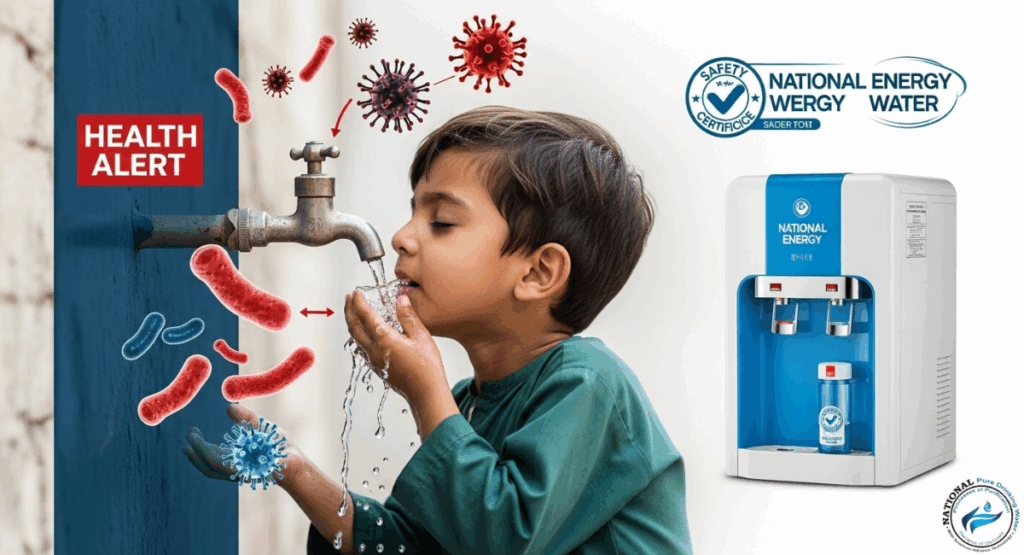
Dirty water can cause:
- Typhoid
- Diarrhea
- Hepatitis A
- Gastroenteritis
In 2025, over 25,000 cases of waterborne illnesses were reported, mostly from lower-income areas that lack access to bottled water or filtration systems.
Children, elderly people, and those with compromised immunity are most vulnerable. Long-term exposure can lead to digestive issues, liver problems, and skin infections.
Why More Lahoris Are Choosing National Energy Water in 2025
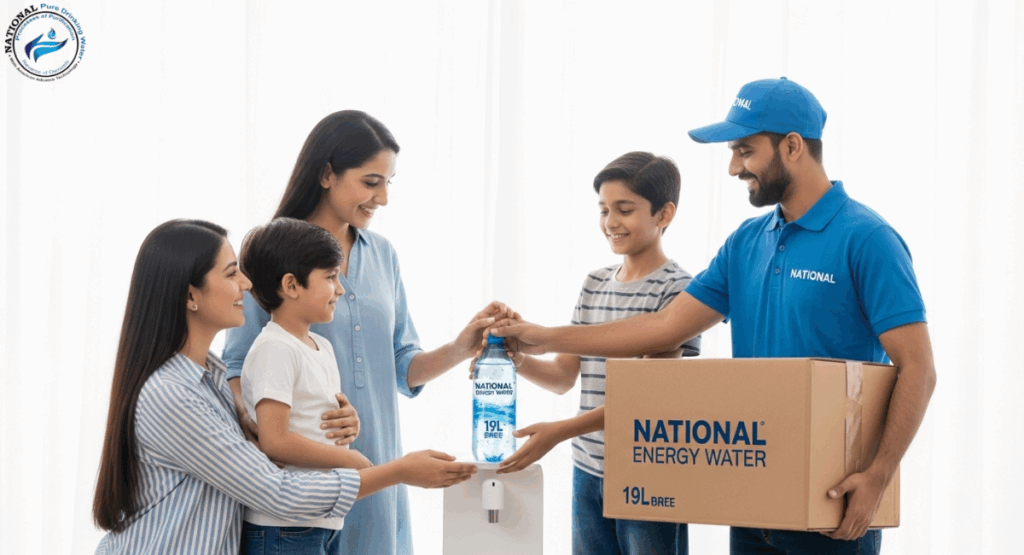
Once considered a luxury, bottled water is now a necessity for many Lahori families. Key reasons for this shift include:
- Trust in branded water
- Visible quality certifications
- Convenient home deliveries
Offices, schools, and homes increasingly subscribe to bottled water delivery services to ensure safe drinking water in Pakistan.
How Safe Is Your Water? Certifications & Testing Explained
The safety of bottled water depends on certifications. In Pakistan, water brands are monitored by:
- PCRWR (Pakistan Council of Research in Water Resources)
- ISO Certification
- PSQCA Standards
- Halal Certification
Bottled water is routinely tested for:
- TDS (Total Dissolved Solids)
- pH levels
- Microbial and chemical safety
These tests are either done in-house or by third-party labs, and only certified brands are legally allowed to sell bottled water.
Best Bottled Water Brands in Lahore
| Brand Name | Certification | Filtration Type | Price (19L) |
|---|---|---|---|
| Nestlé Pure Life | ISO, PSQCA, PCRWR | RO + UV + Ozone | PKR 500 |
| Aquafina | ISO, Halal | RO + UV | PKR 450 |
| Kinley | ISO | RO + Ozone | PKR 430 |
| National Energy water | PCRWR Approved | Mineral + RO | PKR 150 |
Is Bottled Water Worth the Cost? A Practical Comparison
Here’s a cost-benefit comparison between tap water and bottled water in 2025:
| Factor | Tap Water (Monthly) | Bottled Water (Monthly) |
|---|---|---|
| Average Cost | PKR 300 | PKR 5,000 |
| Health Risk | High | Low |
| Taste and Odor | Often Bad | Neutral or Good |
| Convenience | Medium | High |
| Trust & Safety | Low | High |
Though bottled water is more expensive, the health benefits and peace of mind often justify the cost—especially when considering potential medical expenses from waterborne diseases.
The Environmental Trade-Off: Is Bottled Water Sustainable?
Bottled water’s major downside is plastic pollution. Pakistan generates over 3 billion plastic bottles each year, most of which are not recycled. This contributes to pollution in:
- Rivers
- Public parks
- Urban drainage systems
Plastic takes centuries to degrade, making bottled water a threat to the environment.
Sustainable Bottled Water Packaging Options
Some companies are introducing eco-friendly packaging:
- Biodegradable plastic
- Returnable 19L bottles
- Glass water jugs
- Refill stations in offices and cafes
Brands like Springley and HydroLife are leading the charge. If more users adopt these options, Lahore’s plastic waste could drop by up to 40% in five years.
Expert Tips: Making Your Drinking Water Safer at Home
If bottled water isn’t affordable, here’s how you can improve tap water safety at home:
- Install a reverse osmosis filter
- Boil water for 10 minutes
- Use candle or carbon filters
- Store water in clean stainless steel containers
- Keep taps and filters clean
- Avoid plastic containers for long-term storage
These actions greatly reduce your risk and are especially helpful for water testing in Lahore homes.
Frequently Ask Question (FAQs)
Q1: Is tap water in Lahore safe to drink in 2025?
A1: In many areas, Lahore’s tap water may contain contaminants like bacteria, heavy metals, and industrial waste, making bottled water a safer option for daily use.
Q2: What are the advantages of bottled water over tap water in Lahore?
A2: Bottled water undergoes rigorous purification, contains essential minerals, and is regularly tested for safety—making it a healthier alternative to tap water.
Q3: Which is more cost-effective: bottled water or tap water in Lahore?
A3: While tap water is cheaper, bottled water provides better health security and is ideal for drinking and cooking.
Q4: Are there eco-friendly bottled water options available in Lahore?
A4: Yes, some companies in Lahore now offer eco-friendly packaging, including BPA-free bottles and recyclable containers.
Q5: Can bottled water fully replace tap water in households?
A5: For drinking purposes, yes. For tasks like washing or cleaning, tap water is typically used, but bottled water ensures safe hydration.
Final Verdict: Which Water Should You Choose in 2025?
The choice between bottled and tap water in Lahore depends on your budget, location, and health needs.
- If you can afford it, bottled water is safer and more reliable—especially for families with kids or elderly members.
- If using tap water, ensure proper filtration, boiling, and safe storage.
Stay updated with PCRWR reports, invest in a good filtration system, and don’t compromise on your health. In the end, safe water is not a luxury—it’s a necessity.
